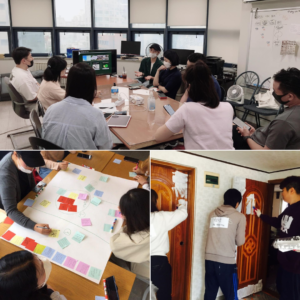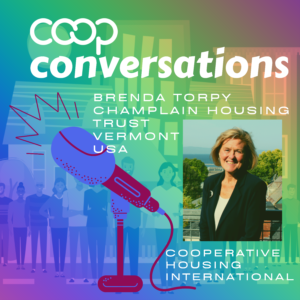Brenda Torpy & CLTs plus Minsnail Housing Co-op in Seoul – April 2021
Coop Conversations Podcast
CHI just launched a podcast called Coop Conversations which is a series of interviews with people living in cooperative housing around the world. Housing co-ops are not like other types of housing. Because of the democratic functioning of housing co-ops, people living there have unique experiences that lead to the creation of a strong sense of community. By listening to conversations we’ve had with different people of all ages from countries like Canada, Ireland, France, the USA and Switzerland, you will learn more about co-op living and why housing co-ops are such wonderfully unique places to live.
In the first episode, we talk to Sarah Jensen, a university student from Thunder Bay, Canada, who grew up in Castlegreen Housing Co-op where she still lives today. Sarah describes the strong bonds she has formed in her community and how getting involved in her co-op and the wider co-op movement has influenced her and shaped her life so far.
The topic of the second podcast is life in a housing cooperative for retirees in France. We talk to Anne Frostin and Chantal Nay, two women who live in Coopérative d’habitants Chamarel les Barges in Vaulx en Velin, just outside of Lyon. Anne and Chantal tell us why they chose to live in a cooperative and how their children are relieved to know that their parents live independently in a warm and supportive community.
The third episode takes a slightly different approach where we talk to a housing advocate from Burlington, Vermont, USA. Brenda Torpy championed a type of affordable land ownership model called a Community Land Trust. She started with the Champlain Housing Trust in Burlington over 35 years ago when she worked in the office of Mayor Bernie Sanders. Today there are now over 260 CLTs in the United States and over 300 in England and Wales. The Champlain Housing Trust is the largest Community Land Trust in the world with 3,000 homes of all types throughout northwestern Vermont serving people experiencing homelessness, homes for people with special needs, affordable apartments for the working class, and a pioneering shared equity home-ownership program that removes financial hurdles for buyers while creating housing that is permanently affordable.
You can find the episodes on our website or you can subscribe on Spotify.

The Origins of Minsnail Housing Co-op in South Korea
by Chan Hong, Minsnail Facility Manager
Minsnail Housing Co-op started as Minsnail Union, in 2011, as a student housing civil organization in Seoul, South Korea that sought to create more dormitories in universities.
The housing conditions for youth in South Korea, especially in Seoul is very harsh. Mini homes called “Goshiwons” (studying houses) were more expensive per square metre than the most luxurious apartments. They weren’t even recognized as legal homes and only measure 2m x 2m.
The youth started to get together demanding schools, governments and society, in general, to recognize students as the “Minsnail Generation” which is a snail without a shell. Lobbying the government and telling them that students were a vulnerable class living in unacceptable conditions mobilized the government to take them seriously and take action. We also brought to light ‘maintenance fees’ which is the name for a charge for non-lease payments to the landlord for gas, electricity, and general maintenance. It didn’t have a guideline and its content was nonspecific. Now Seoul city has a guideline for it, called “One Room Guidelines.”
People took notice but the institutional change was slow. We decided to provide housing for ourselves and created Minsnail Housing Co-op in 2014. The initial housing project land was leased from a civilian landlord, where we built our own home with funding from well-wishers and youth. Now we house over 200 young adults in 15 different homes in three cities: Seoul, Jeonju and Bucheon. Our housing prices are around 60% of the market rate and our social housing model enticed the government to create their own. Thanks to government-owned houses which we run and also civilian contractors, we can provide affordable and long term (6 to 10 years) for people between the ages of 19 and 39. We recently built our own first house from scratch, on Seoul city land.
With respect to our characteristics, we emphasize ‘community building’ within our homes. Each Snail House has a house meeting once a month, and also a “butler” (a tenant that deals with the Co-op office), a ‘maintenance tenant’ (that takes care of facilities) and an ‘accountant tenant’ who is in charge of all areas. We also have programs for community building between Snail Houses such as a bazaar, healing trips and an online second-hand market.
We are trying to implement reusable energy such as solar panels, but haven’t implemented them yet. It is our weak point but we are working on implementing policies to include solar panels and rooftop farming. Members meet every two weeks and talk about different ideas to improve their co-op, including solar, EV charging stations and other environmentally sustainable ideas but the cost is a factor.
Equality education is also factored in Minsnail’s meetings. We discuss gender, age and all equality issues we face inside the homes and how to work toward a more equal and respectful community.
You can read more about Minsnail Housing Co-op here.


